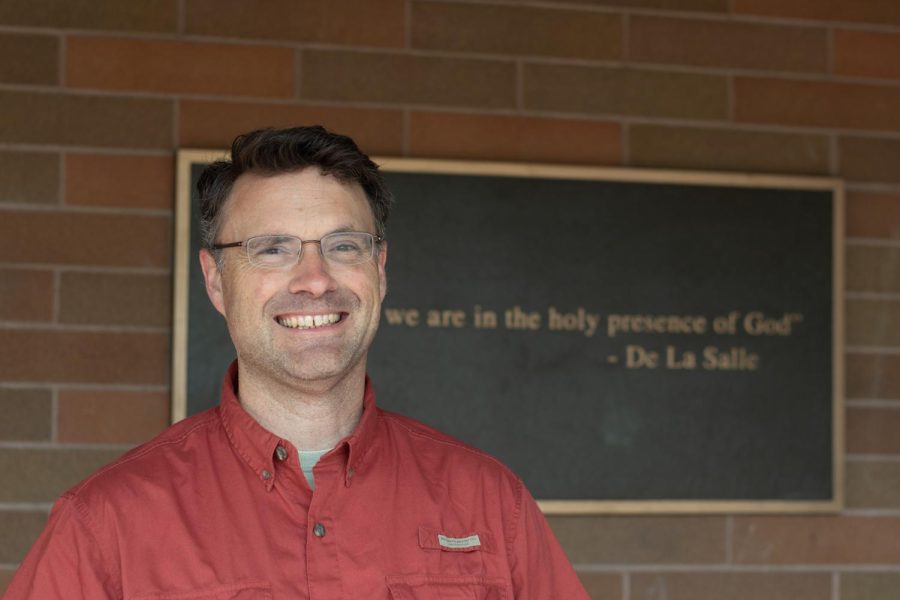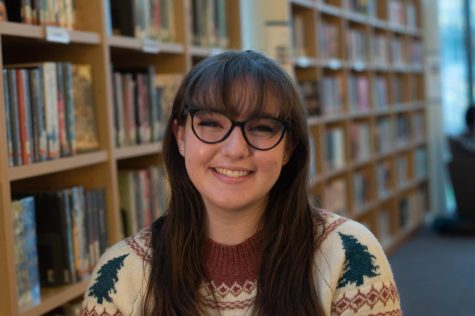Closing a 16-Year Career at La Salle, Director of Faith Dr. Gary Hortsch Moves to Seattle, Washington
“Everyone is authentically searching for their deeper selves, and connecting with a deeper reality, and to me, I find that fascinating, and incredibly satisfying to do as a career,” Director of Faith and Religious Studies Teacher Dr. Gary Hortsch said.
June 1, 2022
For Director of Faith and Religious Studies teacher Dr. Gary Hortsch, his first experience of a Journey retreat similar to those the La Salle community sees today came from the Catholic high school he attended in Stayton, Oregon.
However, at his school, he “recognized that some of my least satisfying classes were religious education,” he said. “My dissertation of ‘how can we do this better?’ really started as an 18-year-old, looking back at my high school experience.”
Even as Mr. Hortsch departs from his 16-year career at La Salle, “I’m still working on that same question today,” he said.
In search of an answer, Dr. Hortsch first trained to become a teacher at the University of Portland. Originally, he was planning on becoming a social studies teacher, but he quickly learned that “my passion and my heart is in religious studies education,” he said.
Immediately after college, he taught at an elementary school in White Castle, LA, through the Alliance for Catholic Education program, which is a two-year training program for teachers in Catholic Education through the University of Notre Dame. Then, Dr. Hortsch graduated from Notre Dame with a Master of Divinity.
Dr. Hortsch’s first employment in ministry was being a retreat minister at La Salle Manor in Plano, Illinois — his first Lasallian experience, where he led two journey-like retreats a week with a resident team. “We all lived in community together and led retreats,” Mr. Hortsch said. “It was a great year.”
After this, Dr. Hortsch was a hall director of Christie Hall at the University of Portland for three years. “I loved resident life,” Dr. Hortsch said. “I loved my undergrad experience there, and the opportunity to come back and serve as a mentor to young people in college was just a great time in life.”
Then, in 2006, through former La Salle Principal Mr. Bill George, he discovered the opportunity to teach religion at La Salle.
“When I started at La Salle, we still used TVs and VCRs … there was less distance between adults and young people, because we all shared the same media — so if everyone’s watching the same television, listening to the same radio, there’s more common experience that people would talk about in everyday life,” Dr. Hortsch said. “But now, with all the platforms for movies, and TV shows, and music, people are more siloed into their own interests and tastes, so it’s harder as a teacher to know what is popular, what is being watched or listened to, and really engaging [with] young people as to what their social lives consist of.”
This made being a teacher — especially one who would “always strive to keep the content relevant to the learner” — more difficult, Dr. Hortsch said. “In Catholic religious education, it’s easy to get caught up in the details of the teachings, but all matters of religious studies really is about lived experience, and making sure that whatever is being taught is connected and relevant to the life of the learner.”
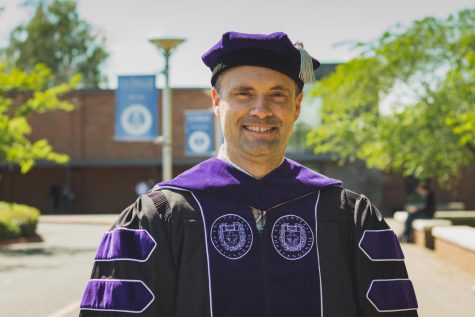
This was one of the reasons that Dr. Hortsch felt led to complete his doctorate at the University of Portland, which he graduated with on May 9, 2021.
“My question concerned, ‘How well are we doing with educating our young people in the faith?’ and really listening to recent graduates as to what insights they can give on how we can continue our best practices, as well as avenues for improvement,” Dr. Hortsch said.
One of the ways that Dr. Hortsch guides people on their faith path is through various retreats, one of which is La Salle’s Called and Chosen retreat program.
While the Called and Chosen retreat has not happened at La Salle for a few years due to the COVID-19 pandemic, in the past, the retreat would consist of sending four students — primarily juniors — to the Russian River to participate in a retreat focused on vocations. “The Called and Chosen [retreat] is really a great opportunity to experience being a big brother or big sister, because you travel together, and you spend the weekend discerning one’s vocation,” Dr. Hortsch said.
Originally, Dr. Hortsch said he second-guessed the notion of being a big brother or sister to students because it felt too close. “But now that I can see the value and virtue in [that] relationship and how important it is to education,” Dr. Hortsch said. “I fully embrace the idea of being a big brother or big sister.”
Another retreat that Dr. Hortsch often leads is the Journey retreat, which started at La Salle in the 1990s with President Mr. Andrew Kuffner, as an offshoot of Central Catholic High School’s program.
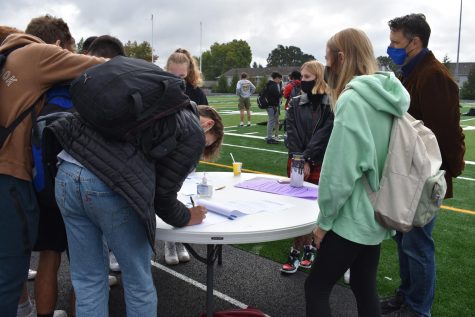
Dr. Hortsch has been directing the Journey program since Journey 51, up until Journey 84, which was this year. Every year, Dr. Hortsch leads two of the retreats, and another staff member will lead the third. This year, Dr. Hortsch led Journey 81 and 83, and Mr. Mac led Journey 82.
There is a similar retreat program at Eastside Catholic School in Seattle, Washington, which is part of the reason Dr. Hortsch chose that school to continue teaching religious studies after La Salle. “Actually, it reminded me a lot of La Salle,” Dr. Hortsch said. “I am definitely looking forward to continuously contributing to Catholic school culture, whether it be at a particular school, or perhaps at a more regional or national level,” Dr. Hortsch said. “I’d definitely like to continue to be part of this system, and to grow with it.”
This community aspect, especially the staff relationships at La Salle, is something that Dr. Hortsch said he will miss. “There have been too many to name,” he said.
Dr. Hortsch carpooled his 35-minute commute to La Salle with a few other teachers for around eight years, calling themselves the “NoPo Carpool” group, because they were based in North Portland. “Many of my greatest memories at La Salle are connected directly to that community,” he said. “We had a very good time together.”
Dr. Hortsch also said that he will miss pet therapy days at La Salle, when he and other staff members used to bring in their pets for students to meet. Dr. Hortsch typically brought in Stefan, his dachshund, who has since passed.
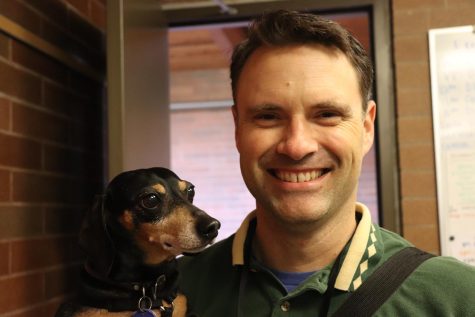
Not only is this community aspect of La Salle important to Dr. Hortsch on a teaching level, but also on a spiritual level. “I feel like the landscape of being religious is something that is constantly changing in our country,” Mr. Hortsch said. “I think people are just as spiritual as they were in the past, it’s just that with the amount of information and experiences that are available … it’s more of a discernment of how do we weigh into the vast amount of information that is available to us.”
“And so, I think at times, it can be a bit overwhelming to discern the variety of voices and influences, [and] the values that are promoted, and I think that for young people, it can be a bit overwhelming to discern which influences are authoritative, and what to follow or not to follow,” he said. “And I think that that’s sort of, existentially, a really big challenge for our global community as we navigate the world with the internet. I think we’re still learning as human beings how to navigate that complex system of information.”
To help sort through the large variety of voices, “I think that the way forward is to cultivate in-person mentors who you can trust,” Dr. Hortsch said. “The way you find a good mentor is observing behaviors that are virtuous [and] trustworthy in the people around you, primarily adult leaders, and seek out their mentorship in discerning what is right or best.”
For senior Natalie Fuchs, Dr. Hortsch has been a mentor to her since her freshman year in Student Council, when she was placed on the Mass planning committee. Now, she is this year’s Officer of Faith. “I remember feeling awkward at first, but he eased my anxieties with an ice breaker question in the dimly lit chapel,” Fuchs said. “When we do sound checks on chapel days and Mass we take turns singing Christmas songs into the microphone. He can really sing!”
Originally, Fuchs was not planning on being the Officer of Faith this year, but after thinking about it more and after her interview with Dr. Hortsch, she accepted. “The interview was done virtually because of COVID, and I was so nervous during the interview that my iPad was shaking on my lap,” she said. “I really wanted the position, and I’m so grateful I got it and a chance to get to know Dr. Hortsch better … I truly wish him the best on his next journey and I know he will make the same impact on the next community he is a part of as he did on ours. He will be missed.”
Fuchs will be a part of the final senior class that Dr. Hortsch sees graduate. “I’ve seen four complete cohorts of Lasallian students go through the doors, which is fun,” Dr. Hortsch said. “One of my takeaways is just a deep appreciation for the deep, authentic, spiritual search of young people today … People today are just as spiritual as they were in years past, and I definitely believe that my research confirmed that idea, and that’s one reason why I really enjoy teaching religious studies, is journeying with people on their pathway of faith.”

